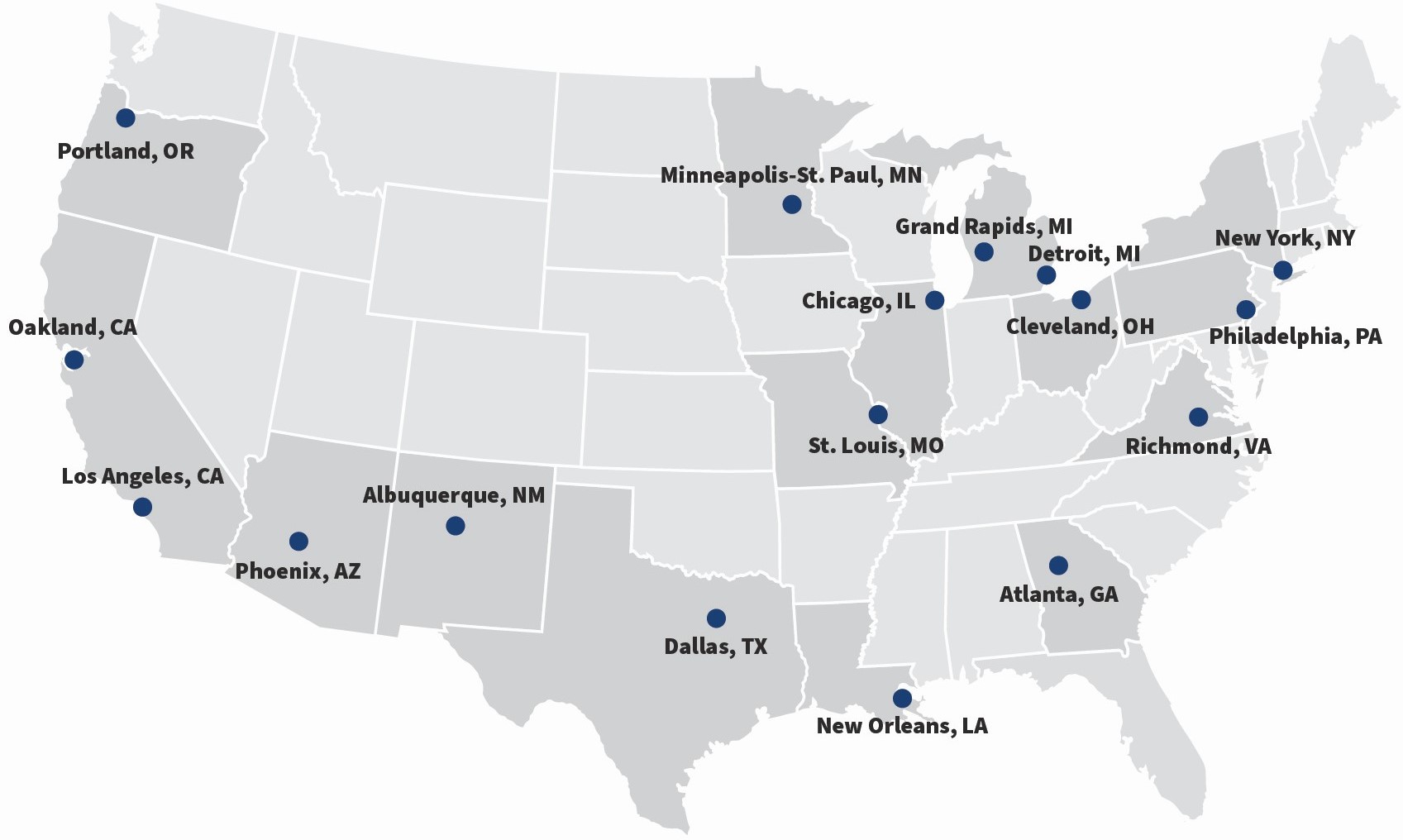Here to Help, Right in Your Community
At USDA Service Centers, you can meet face-to-face with Farm Service Agency (FSA) and Natural Resources Conservation Service (NRCS) employees. You can discuss your vision and goals and learn ways USDA can help your urban operation, such as farm loans, conservation and climate-smart practices, disaster assistance and risk management. We have Service Centers covering every county with staff available right where you grow. This includes Urban Service Centers in selected locations.
Watch our video to learn what to expect from a visit to your USDA Service Center.
 Albuquerque, NM
Albuquerque, NM- Atlanta, GA
- Chicago, IL
- Cleveland, OH
- Dallas, TX
- Detroit, MI
- Grand Rapids, MI
- Los Angeles, CA
- Oakland, CA
- Minneapolis-St. Paul, MN
- New Orleans, LA
- New York, NY
- Philadelphia, PA
- Phoenix, AZ
- Portland, OR
- Richmond, VA
- St. Louis, MO
Find exact locations and contact information for these Urban Service Centers.
If your urban operation isn’t near one of the Urban Service Centers listed above, you can reach your local staff at one of our more than 2,300 Service Centers across the country. Find your nearest office.
Visit Your Urban Service Center
What to Expect at Your Urban Service Center
Prepare for Your Visit to Your Urban Service Center
- Make an appointment. Call or email us to set up an appointment to ensure quick service.
- Interpretation and translation. Interpretation services are available at our Service Center. Learn more about interpretation services.
- Prepare. Ask what documents you will need to make the most of your appointment, such as:
- Proof of identity: government issued photo ID (such as a driver’s license);
- Copy of the property deed, survey plat, rental or lease agreement;
- Tax identification number (Social Security or employer ID number).
- List of your questions, goals, and needs. This worksheet and brochure can help you think this through.
During Your Visit at Your Urban Service Center
- Discuss your business and conservation goals. We need to understand your vision to recommend the right programs for your urban operation. For example, are you looking for access to capital, to rebuild after a natural disaster, or to implement conservation efforts such as improve soil health, install irrigation, a high tunnel or composting facilities, or plant pollinator habitat?
- Establish a customer and farm record. You’ll need these to apply for FSA farm loans, disaster assistance, and risk management as well as NRCS conservation programs.
- Ensure you meet conservation compliance provisions and do an environmental review. You'll need to ensure wetland areas and highly erodible lands are not farmed and do an environmental compliance review, which are required for all USDA program eligibility, including disaster assistance.
- Verify eligibility. For most USDA programs, you must verify you do not exceed an adjusted gross income of $900,000.
- File your program applications. We can help you complete the forms.
- Get a Receipt for Service. Keep this for your own records.
- Sign up for email or text updates. You can do this at the Service Center or visit farmers.gov/subscribe to sign up for email or text message updates.
After Your Visit to Your Urban Service Center
- Keep in touch with your local office. Let us know if your business changes or you experience a disaster or hardship.
- Learn about self-service options. Create a farmers.gov account to manage some of your USDA business independently.
- Participate in your local FSA County Committee or Soil and Water Conservation District. Both FSA and NRCS programs are delivered with involvement of local farmers. Get involved by voting or running for an election.
From community gardens to indoor vertical production, USDA can provide resources to start, expand, and operate your farm or garden, market what you grow, and help you recover in case of disaster.
- Our urban growers page has information about available loans, financial assistance, and free farming guidance.
- If you’re new to farming, you can contact your beginning farmer coordinator; some states even have urban farmer coordinators.
Your local Extension Office can also offer local assistance and resources.
- Cooperative Extension offices address common issues faced by agricultural producers, and conduct workshops and educational events for the agricultural community.
- extension.org is an online community for the Cooperative Extension program where you can find publications and ask experts for advice.

Find Your Local Service Center
USDA Service Centers are locations where you can connect with Farm Service Agency, Natural Resources Conservation Service, or Rural Development employees for your business needs. Enter your state and county below to find your local service center and agency offices. If this locator does not work in your browser, please visit offices.usda.gov.
Learn more about our Urban Service Centers.
Visit the Risk Management Agency website to find a regional or compliance office or to find an insurance agent near you.